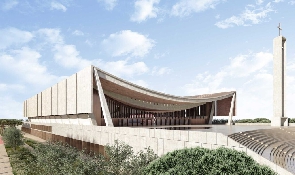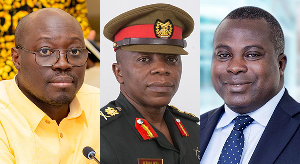The President of Ghana has assured the nation that the controversial “National Cathedral” will be ready by March 6th, 2024. That is to say, barely a year away.
This is of course an engineering impossibility, unless the idea is to launch an uncompleted project. The National Cathedral is not just the cathedral; it also includes a bible museum and extensive “biblical gardens”, among other structures. In fact, the proponents of the cathedral have promised no ordinary museum but the “biggest bible museum in the world“.
There is an obvious reason why bible museums aren’t all that common: artifacts and antiquities to adorn them are fiendishly expensive, at least if genuine, and almost impossible to legally obtain from the Holy Land. The current principal consultant to the National Cathedral, Cary Summers, used to run the US-based Museum of the Bible, which has admitted to obtaining fraudulent, illegal, and even fake bible antiquities.
To secure enough genuine antiquities for the museum, build out the complex engineering required for a world-class museum environment, and then move on to the equally complex task of landscaping a garden and planting exotic plants from a faraway clime etc., would definitely take more than one year. We do not even need to delve into the labyrinthine network of laws and regulations governing the international movement of antiquities.
To give readers a rough hint, here is a super-basic 3-year development timeline for a typical museum borrowed from Mark Walhimer, Managing Partner of consultancy, Museum Planning LLC.

Suffice it to say that as at this morning, the vast majority of these activities have not even commenced for the bible museum.
Some readers may wonder whether the cathedral project could be viewed as modular and thus launchable next year so long as the primary building (let’s call it “the cathedral proper”) itself is complete, even if the museum and gardens hadn’t commenced by then. No such luck. The cathedral proper is also embroiled in complex legal squabbles and stalemates.
To start off, land (about 90 plots), with all structures on it demolished, in the prime Ridge district of Accra worth over three hundred million dollars has already been committed to the project by the State. But the government has refused to settle residual claims by some private real estate companies leading to litigation.
Furthermore, the original $100 million budget for the cathedral proper was eventually bloated to over $400 million after extensive negotiations with the primary contractor, Rizzani de Eccher, acting through a local joint venture entity, Ribade. The cost escalation came about because multiple projects (ranging from hospitals, shopping complexes and schools to art galleries and the multi-level 5000-seat auditorium) were bundled up for strategic reasons (some would say for crony-commercial reasons). The resulting complexity has led to significant project development challenges and conflicts among various contractors. It is now common knowledge that the main contractors have left the site and would require hefty “mobilisation” payments to return.
In short, not only is a timeline of March 6th 2024 unrealistic, there is now a growing likelihood that the project may not even be completed in the life of the current administration. In such an event, what should the next government do?
Not to put too fine a point on it, the current site of the National Cathedral is an eyesore.

The site cannot be left as it presently is. So the new administration would have a clear choice to make: complete the project based on the original concept of a frighteningly expensive “national cathedral” and a fantastical bible museum (with all the murkiness surrounding the antiquity sourcing strategy) or redeem it completely.
Considered carefully, the choice is not that hard. The current government adamantly refused to invest in a national bipartisan consensus behind the project. Consistent with its general posture since coming into office it has done everything to polarise sentiments regarding its strategy.
There is thus no groundswell of positive affection for the original concept, though many Christians are generally well disposed to some kind of official national recognition for the country’s largest faith community. All said therefore, the new administration would not feel bound by the current commitments.
Worse, the national cathedral concept is now mired in perpetual controversy. Right from the outset, besides failure to mobilise nationalist sentiment, narrow profit-making considerations took centre-stage. Instead of using national design contests in the most transparent fashion to appoint the various designers, architects, project administrators, marketers, engineering firms etc., the government opted for shady, opaque, and highly nepotistic sole-sourcing and underhand procurement arrangements, whereby proximity to the presidential family and its acolytes became the main calling card for all those profiting from the scheme.
Not a week passes by without hearing of some profiteering twist to the already sorry saga. The latest is a murky situation involving the Secretary to the National Cathedral.
It has now come to light that a pastor in one of the churches owned by the said Secretary, a clergyman, is, together with his wife and another related party, the owners of a business, JNS Talent Centre, which from 2017 to 2020 was only a small daycare center for young children. As the World Bank poured funding into Ghana as part of the COVID-19 response, all manner of small businesses with links to officialdom managed to transform themselves into contractors and stake a claim to their share of the largesse.
Thus it was that in the last week of August 2021, the Controller & Accountant General paid 3.5 million Ghana Cedis (GHS) into the account of JNS. JNS promptly, just three days later, granted a “loan” to the National Cathedral Secretariat upon receiving a letter from the latter requesting funds on August 26th.
That loan, granted within 24 hours, was then ostensibly “paid back” to JNS later. The sheer incongruity of the conducts, contexts, coincidences and contracts involved here besides, there is an untidiness about a religious project becoming embroiled in such murky related-party commercial transactions.
A similar confusion involves the Nehemiah Group, which is ostensibly a contractor to the National Cathedral, even though its founder, Cary Summers, is also a trusted, independent, advisor. Considering that the National Cathedral secretariat at formation was merely an extension of the Presidency, it is unclear when the Nehemiah Group began billing the country.
But it is now known that it has succeeded in extracting ~$6 million (at prevailing exchange rates) from Ghana under the pretext of guiding the country in sourcing antiquities and funding and for creating a “concept” for the museum. Apparently, Ghana owes it even more money.
None of these payments and others amounting to nearly $60 million were for services tendered openly, transparently and above board in a manner befitting the high ethical standards of a religious undertaking of this magnitude. In fact, leaks and briefings suggest even more underhand commercial transactions are yet to come to public light.
Having become so mired in a perception of venality and poor governance, it would take a momentous effort to retrieve the reputation of the National Cathedral from its current level, the earnest efforts of some of the eminent clergy promoting it nonetheless.
In some ways, by failing to publicly denounce these practices and actively seek to demonstrate true openness, accountability, inclusivity and tolerance for dissenting views, the proponents of the cathedral have lost some of the gravitas they could have lent to the project.
The next government must thus seek a completely clean break from the past. It must gingerly go over the careful policy analysis of IMANI. And it must solicit views from far and near.
If the new administration does all this, it would discover a need to repurpose the precious real estate commandeered by the current government for what has become a thoroughly discredited initiative. It must, in these circumstances, convert the site to a National Civic Center.
The Christian faith can definitely be given prominent recognition in the revamped blueprint. The Chaplaincy of the Armed Forces of Ghana could be invited to manage a smaller, more elegant, ecumenical Christian site at the center (by the way, the very idea of a “non-denominational cathedral” is an ecclesiastical absurdity since Ghana is not an episcopal country and thus can have neither a “national bishop” nor a “national cathedral”).
Such an edifice could be constructed along the lines of Nigeria’s, which cost less than $30 million and was fully funded by the faithful, not the state. A multimedia center charting the translation of the bible into native languages, which paved the way for the indigenisation of Christianity in Ghana, would also be useful to both the faith and scholarly community.
Other religions could be recognised as well. Adherents of Ghana’s marginalised native faiths and the various Islamic traditions could be engaged to contribute monuments celebrating their own contributions to the country.
But there is much that goes beyond religion in defining the national spirit of Ghana. There are patriots who sacrificed everything for its sake. Artistic giants whose feats emblazon the national essence.
From high-life to azonto, and the Allotey formalism to Kofi Annan’s diplomatic legacy, there are many strands of the finest fabric of Ghanaian nationhood that has yet to be woven. They can all have a place at a well-designed National Civic Center.
The National Cathedral episode is, taking all the foregoing into account, a very expensive lesson. Despite years of paying lip service to patriotism, Ghanaian leaders at the least opportunity elevate parochial interests above true national interest and consensus, damaging the country and all its citizens in the process.
If by January 7th 2025, the cathedral remains far from done, the next government may well get the opportunity to cure this national disease by converting the sad symbol of a debased national monument into something truly inclusive, noble, majestic and evocative of what Ghana can be at its best.
Opinions of Monday, 16 January 2023
Columnist: Bright Simons















